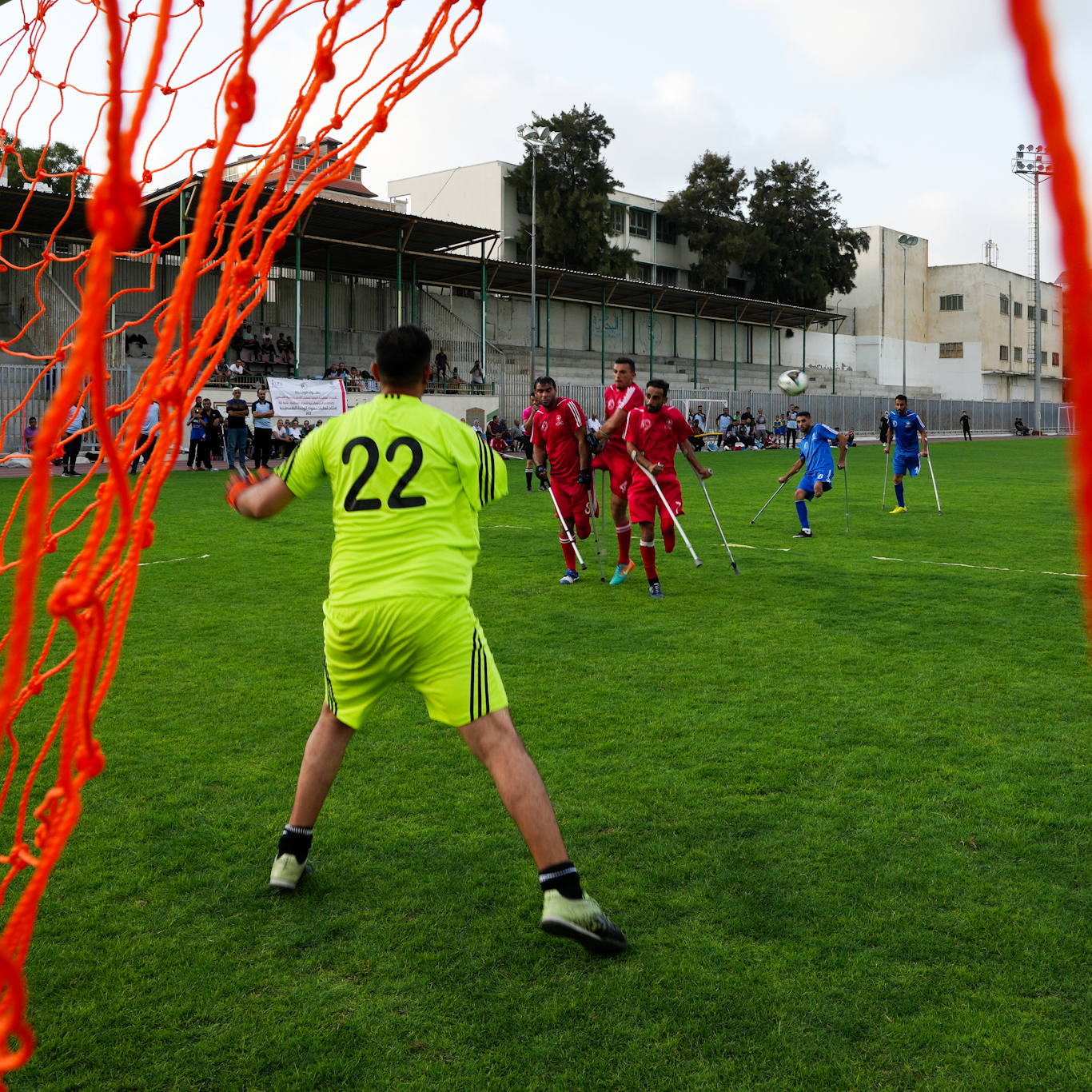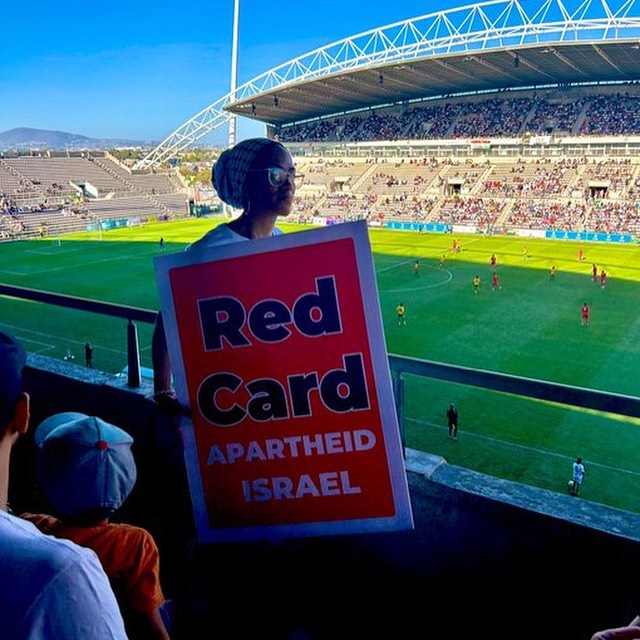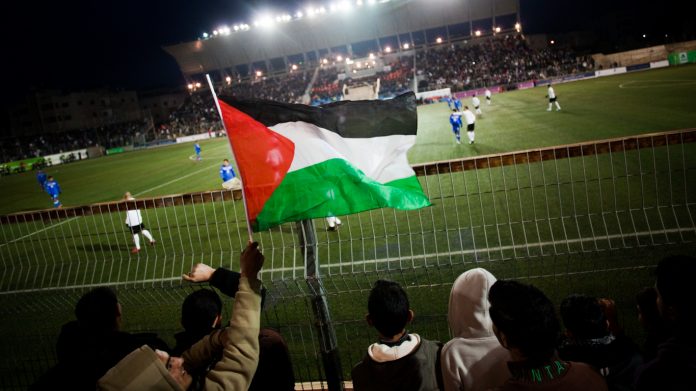Amid an ongoing onslaught against the Gaza Strip by apartheid Israel, the Palestinian national football team was a Cinderella story at this year’s AFC Asian Cup, reaching the knockout stages, eventually falling only to hosts and eventual winners hosted in Qatar. But while the challenge on the football field was hard enough, the Palestinian football team has to deal with a unique challenge that no other national squad faces: that of an unrelenting attack on it from Israel. This attack has included jailing, torturing, shooting and killing top players, bombing Palestinian infrastructure, and restricting the movement of players in and out of the country.
This has led to a growing global movement calling for Israel to be banned from international sporting competitions as part of a wider campaign to implement Boycott, Divestment and Sanctions (BDS). South Africa-based group Red Card Israel, for example, told MintPress that:
The action of suspending Israel from international sport creates a symbolic support against the unlawful occupation of Israel in the Palestinian territories and shows solidarity for the Palestinian people living under the apartheid regime.”
Cutting Down the Tallest Flowers
Palestine started with one simple goal in the Asian Cup: to put a smile on people’s faces back home, giving them hope by representing them on an international stage. In that, they succeeded, becoming the toast of the tournament, playing attractive, positive football, including a 3-0 win over Hong Kong, China. Yet they did so despite generations of players shot, killed or permanently disabled by Israeli warplanes and snipers.
For example, in January 2014, cousins Jawhar Nasser Jawhar, 19, and Adam Abd al-Raouf Halabiya, 17 – young stars about to be called to the national team – were traveling home from a training session near Ramallah. They were ambushed by the Israeli Defense Forces (IDF), who shot al-Raouf in the legs. Jawhar rushed to his aid, only to be peppered with bullets himself, including seven in his left foot, three in his right, and one in the hand. An attack dog was unleashed on them, and soldiers subsequently broke al-Raouf’s leg for good measure, suggesting they knew who the pair were. Their careers were over in a flash, and their destiny was stripped away. Now 29 and 27, respectively, Jawhar and al-Raouf would have been in their prime for the 2024 tournament.
While the pair survived partly thanks to medical treatment in Jordan, many of their peers were less fortunate. Tarek al-Quto, a promising midfielder, was killed by the IDF in 2004. Five years later, during Operation Cast Lead, Israel killed three more top players: Ayman Alkurd, Shadi Sbakhe and Wajeh Moshtaha. Also in 2009, 18-year-old phenomenon Saji Darwish was struck down by an Israeli sniper near Ramallah.

“Arrests, torture and killings of Palestinian footballers became a regular headline in Palestine,” noted Palestinian writer Ramzy Baroud. One of the most infamous examples of this was Mahmoud Sarsak, who was arrested and held for three years without trial or visits from his family.
Protesting his treatment, Sarsak – a Palestinian international star – went on a hunger strike for three months. In the process, he almost died and lost nearly half his usual body weight. His case became a cause célèbre around the footballing world, with supporter clubs and even footballing legends like Eric Cantona, Michel Platini and Lilian Thuram calling for his release. The international pressure caused Israel to relent and free Sarsak, but the permanent health issues he suffered meant his career was over.
Sarsak’s case is far from the most extreme, however. Zakaria Issa, one of the country’s top strikers, was sentenced to 16 years in prison in 2003. After being diagnosed with terminal cancer in 2011, he was released but died four months later.
Sameh Maraaba, meanwhile, has enjoyed a fruitful career, playing 40 times for Palestine in international competitions. He would no doubt have achieved more, however, if he had not been arrested at a border crossing between Jordan and the West Bank and accused by Israel of being an associate of Hamas. Maraaba was detained for seven months, during which he missed many crucial qualifying games for the 215 AFC Asian Cup and the 2014 Asian Games.
And on the same day in 2012, Israeli forces arrested Muhammad Nimr – a promising 23-year-old forward from the Amari refugee camp who had managed to forge a career in Europe – and Omar Abu Roïs, the goalkeeper for the Palestinian national football team. Their arrests spurred more calls for Israel to be barred from international sporting competitions.
Speaking with MintPress News, a spokesperson for Red Card Israel explained that suspending Israel from sporting events would illustrate that “the violation of human rights results in exclusions on an international level and that it cannot continue to blatantly disregard international law while still enjoying the privilege of international participation in sport.”
But even if they have not spent time in prison, the occupation has touched every footballer negatively. Palestinian athletes have to live, train and perform under immense psychological pressure. Mahmoud Wadi, for instance, revealed that he had to live with the constant threat of death during Israeli occupation. “I would go to bed at night and stare at the ceiling expecting it to come crashing down on my head at any moment,” he said of living through Operation Protective Edge. “Many players that I played against or with while in Gaza have died,” he added.
Wadi’s woes did not stop there. A day before Palestine’s first Asian Cup game against Iran in January, he was informed that his cousin had been killed in the Israeli attack.
Blocking Palestine From Competing
Wadi is one of the few Gazans to play for Palestine in recent years. The Israeli government has imposed a medieval-style siege on the densely populated strip. It strictly controls the amount of food and basic goods entering and exiting, making elite sport extremely difficult. Gazan football has suffered, with many top players (including Wadi) leaving for Egypt.
But life for a footballer in the West Bank can also be fraught with difficulties. Israel, which controls so much about life in Palestine, regularly denies exit visas to all domestically-based Palestinian footballers, leading to the country having to forfeit games and drop out of tournaments. Palestine was scheduled to play a crucial World Cup 2010 qualifying match against Singapore, but Israeli officials blocked the team from leaving the country. Despite protests, the footballing authorities elected not to reschedule the match but penalize Palestine, leading to their exit from the tournament. In May 2008, the team was barred from leaving the country to play at the AFC Challenge Cup. Three years later, two national team players were refused reentry into the West Bank after a match against Thailand. It is, in part, these sorts of arbitrary travel restrictions that have led selectors to look to the diaspora Palestinian population for players.
The constant Israeli military attacks have also taken a toll on the footballing infrastructure. In 2009, Israel destroyed the Rafah National Stadium in Gaza. And no football is being played at Yarmouk Stadium in Gaza City because Israel has turned the structure into an open-air prison camp. Images showing dozens of Palestinians – some as young as nine years old – stripped and paraded around at gunpoint went viral on social media in December, sparking global outrage.
All of this has meant that Palestine regularly has to play its “home” games in other countries. The team had to pull out of the Merdeka Tournament in Malaysia due to the Israeli onslaught, and Palestine is scheduled to play all of its upcoming home matches for the 2026 World Cup qualification tournament in Kuwait.
Should Israel Be Banned?
In contrast, aside from some vocal opposition from opposing fans at games, Israel and its national football team have faced almost no negative repercussions. This is partially due to the position of the sport’s governing body, FIFA, which has consistently refused to act upon requests to hold Israel to account. In January, the Palestinian Football Association released a formal request calling on FIFA to ban Israel from sporting competitions over blatant human rights violations like the ones cataloged here.
It is not as if FIFA has not taken action before. In the 1990s, it banned Yugoslavia from competing at the 1994 World Cup amid a war in the Balkans. And in 2022, the organization indefinitely suspended Russia from international competitions because it invaded Ukraine. Yet these states were carrying out actions that Western powers – above all, the U.S. – opposed. In contrast, aggressive actions or human rights violations by Western powers never result in FIFA bans – a fact suggesting where the real power in the organization lies.
Indeed, it appears that opposing Israeli attacks is more likely to result in negative consequences than carrying them out. A number of professional footballers in Europe have been fired for making public comments criticizing Israel or supporting Palestine. Indonesia, slated to host the FIFA 2023 Under-20 World Cup, was stripped of that honor after uncertainty over whether it would allow the Israeli team to compete. (Indonesia does not maintain diplomatic relations with Israel).
As such, in football, as with politics, any actor proposing or carrying out a principled, non-violent boycott of Israel is likely to face consequences from authorities. Thirty-seven U.S. states currently have anti-BDS laws on their books, despite the fact that nearly three-quarters of Americans oppose such legislation.

Despite the opposition from football’s governing body, a growing grassroots global movement is emerging, demanding sporting authorities take action to oppose genocide. That this is being led by South Africa is significant.
That so much of the Palestine solidarity movement emanates from South Africa is significant. Until the 1990s, South Africa was dominated by a human rights-abusing apartheid regime. But mounting international pressure turned the country into a pariah state and forced South Africa to change its ways.
Throughout the period, though, the white supremacist government maintained support from both the Israeli and American governments. Today, South Africa is leading a team at the International Court of Justice charging Israel with the crime of genocide. Red Card Israel explained that they see the victory in South Africa as a blueprint to follow, telling MintPress that:
The intention behind the boycott of Israel in football (and other sports) is to further the intention of gaining equality for Palestinians on all international and political fronts. South Africa is best placed to bear testament to how sports, academic and cultural boycotts add pressure on illegitimate governments to crumble under the weight of unjust systemic oppression. It worked for South Africa, so there’s no reason why it won’t work in the case of Israel.”
As we have just seen at the Asian Cup, sport has the potential to unite people, both nationally and internationally. Football fans around the world have shown their solidarity with Palestine, and many are now organizing to make the dream of an end to apartheid a reality. It is clear, however, that football’s authorities will not welcome this movement. So, to achieve victory, organizers must show as much courage and determination as the Palestinian team did on the pitch this January.
Feature photo | Palestinian soccer supporters watch a match between the Palestinian team and Thailand in the West Bank town of Al-Ram, near Ramallah. Bernat Armangue | AP
Alan MacLeod is Senior Staff Writer for MintPress News. After completing his PhD in 2017 he published two books: Bad News From Venezuela: Twenty Years of Fake News and Misreporting and Propaganda in the Information Age: Still Manufacturing Consent, as well as a number of academic articles. He has also contributed to FAIR.org, The Guardian, Salon, The Grayzone, Jacobin Magazine, and Common Dreams.
The post Goalposts and Gunfire: Israel’s Deliberate Attacks on Palestinian Football and Its Players appeared first on MintPress News.
